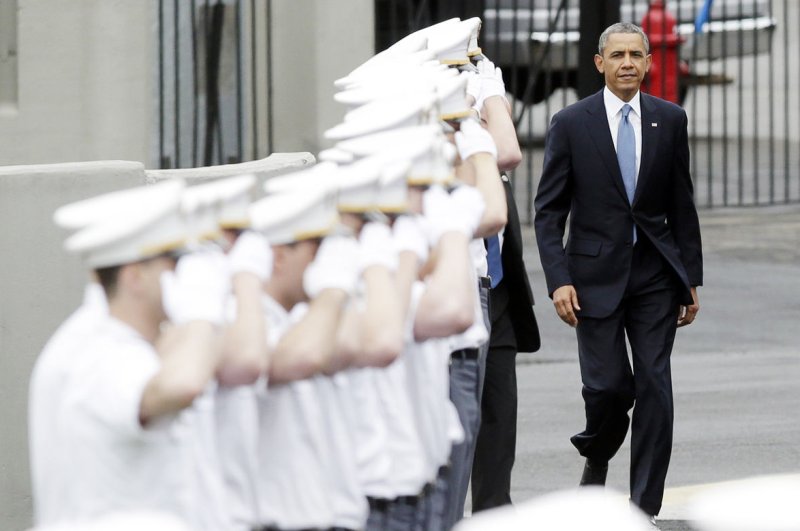1 of 5 | United States President Barack Obama enters before speaking at the West Point graduation ceremony in Michie Stadium at the United States Military Academy at West Point, New York on May 28, 2014. UPI/John Angelillo |
License Photo
WASHINGTON, June 10 (UPI) -- Last Friday's meeting between U.S. President Barack Obama and Russian President Vladimir Putin lasted 15 minutes at most. Yet the symbolic significance of that highly-anticipated face-to-face far exceeded the parameters of its informal nature.
After commemorating the 70th anniversary of D-Day in an address at the Normandy American Cemetery and Memorial overlooking Omaha Beach -- a cemetery containing the remains of 9,387 U.S. servicemen who gave their lives in one of the most epic military events in history -- Obama met with Putin on the sidelines of a lunch attended by 20 world leaders.
According to Ben Rhodes, deputy national security adviser for strategic communications, Obama stressed the significance of Ukraine's recent election of President Petro Poroshenko, with whom Putin also met while in France.
"If Russia does take this opportunity to recognize and work with the new government in Kiev, President Obama indicated that there could be openings to reduce tensions," Rhodes said.
What the world witnessed then wasn't merely a meeting between superpowers whose recent past is fraught with high drama -- necessary WWII allies turned unnecessary Cold War enemies, and renewed animosity over everything from the ongoing crisis in Ukraine to the Syrian civil war to Iran's nuclear program. Indeed, the luncheon was so tense French President Francois Hollande sat between Obama and Putin, along with queens of Britain and Denmark, and dined with each president separately the night before. But more than anything, the meeting was indicative of Obama's recent embrace of diplomacy.
When Obama addressed West Point graduates in late May, he called for a definitive shift in U.S. foreign policy toward "collective action" with allies throughout the world. Taking a non-interventionist stance, Obama said, "Just because we have the best hammer does not mean that every problem is a nail."
America will not repeat the "costly mistakes" of the past, Obama claimed, which came from rushing (all-too-often at lightning speed) to unilateral military action. Instead, the president said, "We must broaden our tools to include diplomacy and development; sanctions and isolation; appeals to international law and -- if just, necessary, and effective -- multilateral military action."
The U.S. will work more with international institutions such as the United Nations and NATO, which Obama praised and has since recommitted to. He also announced the creation of a $5 billion "Counterterrorism Partnerships Fund," which will "train, build capacity, and facilitate partner countries on the front lines," ostensibly in order to combat terrorism in places like Yemen, Libya, Somalia, Mali, and elsewhere without the U.S. getting sucked into another decade-long, trillion-dollar war.
Of course, the Obama administration's track record belies such rhetoric. After all, this is the same administration that escalated the war in Afghanistan twice. The same administration that waged war on Libya without declaring it, and said it would close the military prison at Guantanamo Bay (and vowed to do so again during Obama's speech). The same administration whose overreliance on clandestine drone strikes, which -- despite Obama's West Point promise to provide greater transparency -- have killed countless innocent victims alongside targeted militants, undoubtedly perpetuating hatred toward the U.S.
Still, we're suddenly seeing the Obama administration commit to diplomacy like never before. On the heels of Obama's West Point speech, we witnessed the now controversial maneuver to exchange five Taliban prisoners for Sgt. Bowe Bergdahl. Forget the absurd politicking and public outcry that has followed. What's remarkable about Obama's decision to secure Bergdahl's freedom is that it required the U.S. to negotiate with terrorists -- something often verboten for U.S. presidents, except when it isn't.
And just Monday, U.S. officials met with the Iranian delegation for five hours in Geneva regarding Iran's nuclear program. The meeting was considered "positive and constructive," and comes as Iran is about to engage in a fifth round of nuclear talks with the P5+1 -- the five permanent members of the U.N. Security Council (U.S., U.K., France, Russia, and China) plus Germany.
Perhaps it's easy to get swept up in Obama's ambitious West Point goals. However, the administration is starting to prove that tough sanctions followed by bi-, tri-, and multi-lateral diplomacy could dissuade Iran from pursuing its nuclear agenda. That diplomatic efforts could help ease Russia from the brink of war with Ukraine, and bring home America's only POW from Afghanistan.
As Obama told West Point grads, "We must not create more enemies than we take off the battlefield."
But time is running out for Obama to fulfill such diplomatic promises. Because chances are, his successor will be far more hawkish.















